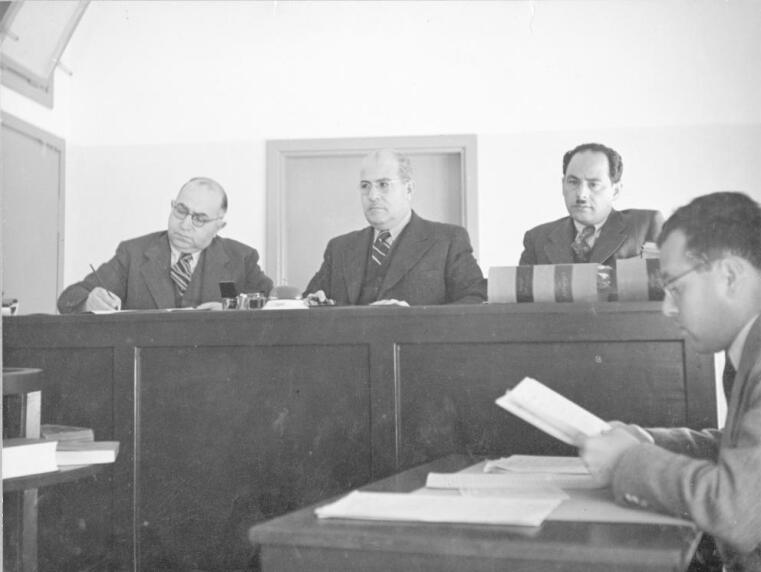"An exceptional Exception"
Communal-informal tribunals as a form of legal pluralism in Mandatory Palestine

Professor Dr. Dr. Eyal Katvan is currently a fellow at the EViR Kolleg, where he is investigating family litigation in communal-informal tribunals in Mandatory Palestine (1920-1948). The territory was characterized by great social diversity as well as a volatile political situation during this time and therefore represents a productive field of research for the topic of legal pluralism. In this interview, Professor Katvan provides insight into his research project and describes how he experiences the digital fellowship.
Professor Katvan, you are an expert on the legal landscape of Israel, which is shaped by legal pluralism. Where does this remarkable diversity come from?
Israel (and pre-state Israel) is a unique locus in terms of diversity. And indeed, diversity led to or created legal pluralism. Imagine, that within 40 years (late 1917 – 1948), there has been two regime upheavals, and therefore three different rulers: the Ottomans, the British and the State of Israel. Each brings and creates a new legal system, but also keeps (most of) the former one. At the end of the 19th century the country’s population was also diverse. At that time, waves of Jewish immigration brought with them immigrants from all over the world – adding to this diverse society. This diversity is also in correlation with legal pluralism since the various rulers also took (in certain instances) into consideration the nature of the country’s multi-national-religious-ethnic society. For example, by allowing different religious communities to discuss certain matters in religious courts, or by allowing the co-existence of informal courts alongside the governmental courts.
In our first year at the centre, we investigate the dynamics between rule and exception that seem to correlate with the relationship between legal unity and pluralism. Your research project on family litigation in Mandatory Palestine is called „an exceptionally exceptional exception“. Can you describe the system of the various formal and informal family courts and explain how they were an exception to the rule?
The Rabbinical Courts in Mandate times held exclusive jurisdiction in matters of marriage and divorce, alimony, and confirmation of wills. This was a rule, but one may also consider this as an exception to the rule of the British civil courts. In other words, the fact that the British in Mandate Palestine (and its civil courts) recognized the jurisdiction of religious courts (over personal status matters) is, in itself, an expression of legal pluralism and an exception.
However, the picture is more complex, as the law in Mandate Palestine enabled a consensual jurisdiction in other (ancillary) matters of personal status. Not only religious courts (in the case of the Jewish population the Rabbinical courts) ruled in these cases, but also community based (informal/arbitration) tribunals – which served as the exception to the rule.
Two of these informal community tribunals were set by the Jewish Yishuv in Palestine: The Hebrew Court of Peace (“Mishpat Hashalom Ha’Ivri”) which primarily dealt with disputes between Jews belonging to all (civil) segments of the Jewish population; and the Workers Union tribunal (“Mishpat Chaverim shel HaHistadrut”, Hebrew Comrade Court) that settled disputes among its members. About 50 cases dealt with family matters. This, again, is an exception, even within the boundaries of the informal courts themselves.

"There was a social-community sanction for those who refused the (consensual) jurisdiction of the informal courts"
When we look at the individual litigants – was it an advantage or a disadvantage for them to find so many competing courts, which in principle all had jurisdiction?
It seems to me that the individual has an advantage in being able to choose the type of trial court to be tried in. However, it should be noticed, that this is not necessarily a real choice. First, any litigation has at least two parties, so the choice of one of the parties does not necessarily binds the other party. Secondly, at least when it comes to the two informal courts, there was a social-community sanction for those who refused their (consensual) jurisdiction – a fact that actually curtailed the litigants’ freedom of choice. However, if both parties agreed upon (consensual) jurisdiction they probably enjoyed a court more suitable for their needs and preferences.
Were there, as far as you can see, any attempts to remove the exceptions and unify the legal system?
During the Mandate, the informal tribunal’s status declined. Various explanations were given for this, including the fact that the lawyers introduced formalism into this apparatus and undermined its attractiveness. So that, in fact, the number of courts and institutions that could be approached during the Mandate period was declining as well. The religious courts retained their authority: the Rabbinical courts continued to discuss personal status issues, and in 1953 their exclusive jurisdiction over matters of marriage and divorce among the Jews was recognized by the Israeli legislator. In a nutshell, it was in the 1990’s, that the Israeli Supreme Court outlined a “unity thesis”, according to which the Rabbinical Courts must refer to the civil principles of human rights and gender equality while applying their jurisdiction.
As one of the very first fellows, you have just started your work at the centre. What are your hopes for the time of your fellowship?
A digital fellowship is also an exception… As academics, we are used to face-to-face meetings, exchanging thoughts and ideas, and discussing our studies either in conferences or during fellowships in various universities and institutes. Covid-19 changed these habits. The world turned into Zoom meetings. When applying for the digital fellowship, I wasn’t sure whether it is possible to create an academic community online and to produce a similar atmosphere – and surprisingly it works! Although the fellowship has just begun, I can already say that the planning and program of the digital fellowship is remarkable. It allows an insightful deliberation with other colleagues who all deal with “legal pluralism”. Although the other fellows focus on different time periods, different perspectives of legal pluralism, and different methodologies, there are many common denominators between the members of this group – a fact that enables a fruitful work and a basis for collaborations. Preparing papers for the Reading Sessions, commenting on each other’s work, meeting during “Tea Time”: all this allows a gradual and systematic progress of my own project. So, in terms of hopes, the time I have already spent on this fellowship is beyond expectations. If I may use the title of my project – the fellowship is an exceptional exception!
The questions were posed by Lennart Pieper.

